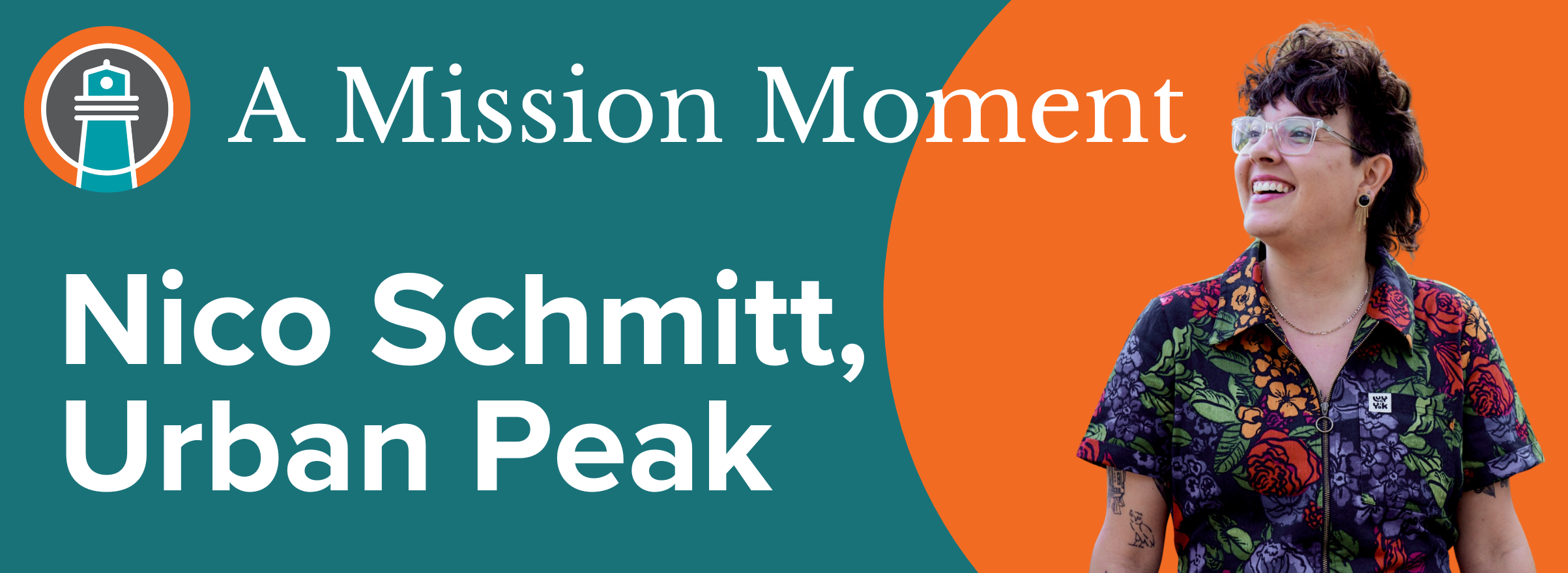
Editors Note: In the spring of last year, Lighthouse began our partnership with the staff at Urban Peak, offering Vicarious Trauma Workshops to provide a space for social service workers to express their feelings and process trauma-related experiences through writing. What follows is one of the participant's experiences in the workshops.
One of the first questions I asked Nico when we sat down for coffee was, “Are you a writer?” Nico laughed and said, “Does anyone know how to answer that question?”
Nico Schmitt is one of those amazing people who have dedicated their lives to helping our underserved communities. For the past eight years, they’ve been involved at Urban Peak, a nonprofit organization in Denver that provides a full convergence of services for youth experiencing homelessness.
“I first started working at Urban Peak as a volunteer, helping with street outreach and case management,” said Nico. “I came on full-time a few years after.”
Urban Peak is one of Denver’s true gems. Not only do they aim to ignite the potential in youth to exit homelessness and create self-determined, fulfilled lives, but their goal is for all Colorado youth to have safe housing, supportive relationships, and the opportunity for self-sufficiency and success.
“The youth that we work with are the best people in the whole city,” asserted Nico. “I was fortunate enough to work directly with youth experiencing homelessness for over six years, and those years were really just full of laughter, joy, and so much resiliency.”
However, like working in any social service industry, Nico was faced with many challenges.
“Helping young people navigate those really messy systems like affordable housing and finding social service providers, that was tough,” said Nico. “There was so much chaos and beauty happening simultaneously that I felt like I needed to find some way to sum up my day so I could leave it at work and go home. I started writing a poem after each day of work, capturing the camaraderie between clients, a young person having a hard time, the shimmering light of Denver, or whatever else. I had a huge running Word document for years.”
A few years ago, Nico took on a new role at Urban Peak to create onboarding procedures and to ensure staff had the resources they needed to succeed in their roles. In short, Nico experienced firsthand how powerful a tool writing could be.
“I knew helping them find a tool like writing could help,” said Nico.
In the spring of last year, Lighthouse began our partnership with the staff at Urban Peak, offering Vicarious Trauma Workshops to provide a space for social service workers to express their feelings and process trauma-related experiences through writing. These workshops balance serious work with fun, creating a much-needed community for social service workers who can relate to one another and celebrate each other's efforts through storytelling. While these workshops are not a form of group therapy, they often have positive effects on participants.
In fact, through a similar program at the Colorado Resiliency Arts Lab (CORAL), Lighthouse, UC Health, and Children’s Hospital Colorado found that art therapy (including creative writing) delivered some concrete and definite benefits for healthcare professionals experiencing burnout. They found that a year after the program, participants felt a 27% reduction in feelings of anxiety, a 36% reduction in feelings of depression, a 12% reduction in sensations of emotional exhaustion, and a 28% increase in feelings of positivity and hopefulness.
“These workshops have been a real benefit for our staff,” said Nico. “Each month when we go to Lighthouse and meet in a space that’s close by and bright, it’s been really helpful to get us in the right mindset for writing and healing.”
Lara Jacobs is one of Lighthouse’s faculty who leads the workshops (she also leads Hard Times and CORAL workshops). She often gives generative prompts related to perspective. Recently, she asked the workshop participants to look at a photo of themselves and write about it in the third person, or as she put it, “found perspective.”
“I actually ended up just writing about my personal life during that exercise,” said Nico. “It helped me think about gender and identity and how you view yourself, and leaving space for how others view you. No matter how good we are at separating ourselves from our work, our own life experiences will always be in the workplace. So processing these things on our own so we can help the people we work with process it in themselves so we’re showing up a bit more integrated in our work.”
Nico shared that the staff at Urban Peak have found a lot of healing during the workshops.
“Lighthouse has allowed us to show up as we want, in our own unique ways, and find a way to talk about our perspective,” said Nico. “We’re grateful for the partnership.”
_________
Lighthouse’s community engagement programs, including the Vicarious Trauma Workshops, rely on the transformative power of creative expression, providing solace and support to underrepresented members of our community facing challenges such as poverty, trauma, or illness. Our programs include specially crafted writing workshops for individuals experiencing homelessness, veterans, healthcare workers, social service workers, and various other communities in need. Our affinity groups, Writing in Color for BIPOC+ writers and Queer Creatives for LGBTQIA+ writers, go beyond symbolic gestures of inclusion; these programs are run by and for members of these communities and actively foster a more comprehensive and equitable writing environment through workshops, readings, social activities, and retreats.
While Lighthouse does generate revenue from some of our workshops and events, the way we’re able to bring writing into our community is through philanthropic support. If you, too, believe in the transformative power of writing and want to help us create more opportunities, like the workshops for staff at Urban Peak, please consider donating to Lighthouse.

